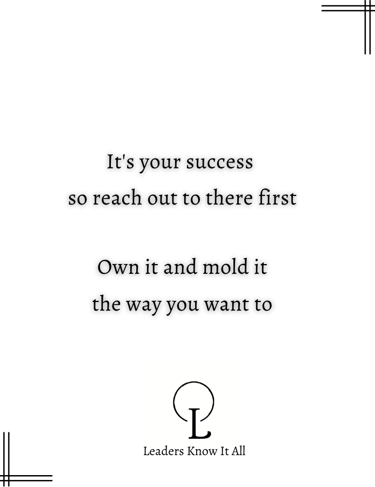It's your success
It's your success, reach out to there first. Own it and mold it the way you want.
LKIA
6/1/20235 min read
Own Your Success: Why Taking Charge of Your Journey Matters
We often hear people say, “Luck was on my side,” or “I just happened to be at the right place at the right time.” While humility is a beautiful trait, there’s also a danger in constantly attributing our success to external factors. At some point, you need to pause, look in the mirror, and acknowledge: I did this. I worked for it. I achieved it.
It’s your success, and you owe it to yourself to reach out for it first. Own it and mold it the way you want.
Taking ownership of success doesn’t mean arrogance. It doesn’t mean ignoring the people who supported you along the way. What it does mean is embracing your role in creating your journey—recognizing your effort, your resilience, and your growth. When you own your success, you also take accountability for your failures, and that balance is what makes you a strong professional, and more importantly, a true leader.
Why Owning Your Success Matters
There’s a subtle but significant difference between people who acknowledge their success and those who constantly deflect it. When you own your success:
You reinforce your self-belief.
You set a standard for others around you.
You inspire your team, colleagues, or even your family to chase their own goals.
You become more resilient because you understand the relationship between effort and results.
If you keep giving credit to luck or circumstances, you unintentionally send yourself a message: “I’m not really in control of my life.” That mindset can make you passive. But when you say, “Yes, I worked for this and I deserve this win,” you remind yourself that you are capable of shaping your future.
Success Is Not Just About Results
When we talk about success, it’s tempting to think about promotions, awards, or money. But true success isn’t only about the destination—it’s about the process.
Every late night you put in, every difficult decision you took, every time you pushed yourself beyond comfort—that’s success in itself. Even if the result wasn’t perfect, the effort taught you something, and that learning is a victory.
When you own your success, you don’t just celebrate the big milestones; you learn to appreciate the smaller steps that brought you there.
Celebrate Your Victories
Here’s a reality we often overlook: many of us are uncomfortable celebrating ourselves. We downplay our achievements because we fear sounding arrogant. But there’s nothing wrong with saying, “I’m proud of what I did.”
Celebrating success serves two purposes:
It motivates you. When you recognize your progress, you fuel your own drive to do better.
It inspires others. People around you see that hard work pays off, and they find encouragement in your journey.
Think of it this way: if you can celebrate other people’s wins, why not your own? The world doesn’t just need humble leaders; it needs leaders who know how to uplift themselves and their teams with genuine pride.
The Flip Side: Owning Mistakes
Of course, leadership isn’t only about celebrating achievements. Real leaders also own their mistakes.
If you’re quick to claim success but equally quick to blame others when things go wrong, your credibility collapses. Success and failure are two sides of the same coin. Both belong to you.
When you admit a mistake:
You demonstrate integrity.
You create a culture of trust.
You turn failure into a learning opportunity.
In fact, many great leaders are remembered not because they never failed, but because they took responsibility when they did.
Leadership and Accountability
As a leader, you are the owner of your decisions—both good and bad. This can feel heavy at times, but it’s also incredibly empowering. Why? Because accountability gives you control.
If you blame external factors for every outcome, you’re essentially saying: “I can’t change anything.” But if you own your decisions, you hold the power to adjust, adapt, and do better next time.
This is why teams respect accountable leaders. People don’t follow perfection; they follow honesty, consistency, and courage.
The Role of Growth Mindset
A key part of owning your success is adopting a growth mindset. Coined by psychologist Carol Dweck, a growth mindset is the belief that abilities and intelligence can be developed through effort, learning, and persistence.
With a growth mindset, success is never final, and failure is never fatal. Every achievement becomes a stepping stone, and every setback becomes a lesson.
Imagine two people:
One says, “I succeeded because I’m naturally talented.”
The other says, “I succeeded because I worked hard, learned from mistakes, and kept going.”
Who do you think will achieve more in the long run? The second person—because they see success as something they can repeat and expand. Talent may open doors, but growth mindset keeps them open.
How to Take Ownership of Your Success
So how do you practice this in real life? Here are a few simple but powerful steps:
Acknowledge your role. The next time you achieve something—big or small—say it out loud: “I did this.”
Share the credit wisely. Thank those who helped you, but don’t erase your own contribution.
Celebrate intentionally. Take a moment to treat yourself or reflect on your journey.
Document your progress. Keep a success journal. Writing down your wins helps you recognize patterns and growth.
Take responsibility for failures. Instead of avoiding blame, ask: “What could I have done differently?”
Focus on learning. Whether it’s success or failure, extract lessons and apply them.
Stay humble, but not invisible. There’s a balance between arrogance and invisibility—find it.
Stories of Ownership
To make this practical, let’s think of two scenarios.
Scenario 1: An employee completes a project ahead of schedule and immediately says, “Oh, it was nothing. Just lucky, I guess.”
Scenario 2: Another employee says, “I worked hard on planning the timeline and coordinating with the team, and I’m really happy it paid off.”
Both statements sound humble. But only the second one shows ownership. Which employee do you think the manager will notice more?
Now think about leaders you admire. Do they hide their wins? Or do they share them with confidence and humility, showing others what’s possible? Ownership creates visibility—and visibility creates opportunities.
Success as a Journey
Finally, let’s not forget: success is not a destination. It’s a journey of continuous growth. The moment you start treating success as a final stop, you risk stagnation.
Instead, see every success as a checkpoint. Celebrate it, learn from it, and then set your eyes on the next challenge. This mindset not only keeps you motivated but also helps you enjoy the ride.
Because at the end of the day, leadership is not just about reaching the top—it’s about staying true to yourself throughout the climb.
Final Thought
Success is yours. Own it. Celebrate it. Learn from it. Shape it into something bigger.
When you take ownership of your success, you also accept responsibility for your failures. That’s what makes you authentic. That’s what makes you credible. And that’s what makes you a leader worth following.
Remember: success is not about luck, titles, or appearances. It’s about effort, mindset, and accountability. So don’t shy away from your victories. Claim them, honor them, and let them fuel your next step forward.
Because success, in the end, is not about reaching a destination—it’s about taking control of your path and enjoying every part of the journey.
Love and Light
LKIA


